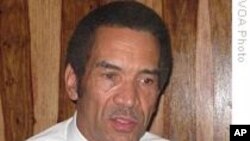In a year-and-a-half since Botswana’s new President Siretse Khama Ian Khama took office, he says Botswana has made great strides in governance and personal freedoms, even within the distinctive characteristics of its own single-party ruling system. As Botswana’s vice president, President Khama, the son of post-independence President Sir Siretse Khama who led Botswana from 1966-1980, took over for Festus Mogae, who resigned the presidency on April 1 of last year. The country is scheduled to vote in general elections later this year.
In an exclusive Voice of America interview, conducted last Thursday, shortly after Botswana marked its 43rd anniversary of independence on September 30, President Khama reflected on how Botswana can help countries beyond its borders, from Zimbabwe, to Kenya and Madagascar, to extend the benefits of democratic rule to their own peoples.
He noted that Botswana has actively criticized Harare’s conduct of runoff elections, land reform, and power-sharing. But he also contended that the outlook of Zimbabwe’s other neighbors and the impact of western-led criticism of President Robert Mugabe’s rule must be taken into account in assessing the effectiveness of the current power-sharing arrangement in Harare.
“There is a sense of solidarity on the continent not to try and criticize others. I think those in the international community who led the criticism about Zimbabwe were predominantly from the West, and Robert Mugabe cleverly used that to give the impression that this was a black-white thing, especially when it came to the land issue,” said President Khama.
He noted that Zimbabwe’s neighbors within the Southern African Development Community (SADC) were reluctant to criticize Harare’s attempts to redistribute the land. What was wrong with Zimbabwe’s methods, he said, was “the manner in which they went about it, the violence that accompanied it. And that was something which was just unacceptable.”
President Khama said Botswana has been disappointed that several SADC and African Union (AU) member states had failed to criticize leaders who come into office and perpetuate their rule after their terms expire either through manipulation, election rigging, faulty runoffs, or flawed power-sharing arrangements.
“I think with some of them, they probably looked at it from the point of view that, ‘look, this may happen to us one day. And if we have everyone else calling for our removal, let us consider that we may be in the same situation.’ And therefore, they are careful about criticizing another leader, even if he is doing things which they may not necessarily agree with,” he suggested.
President Khama says he agrees with the notion that countries that freely practice democratic principles should work to extend the spirit of independence across the African continent to engage others by promoting democracy beyond their own national boundaries.
“We are now proactively trying to make attempts in that regard. We have been outspoken about Zimbabwe. I have said that the power-sharing agreement in Kenya was a bad precedent, as what it is now in Zimbabwe, and what is now being spoken about in Madagascar, because I said what we should really be trying to achieve is to bring about free and fair elections on the continent,” he said.
President Khama said that Botswana finds it unacceptable that the current ruling party in Madagascar, with the aid of the military, may be trying to stay in power by default, perhaps by trying to “engineer” an election process. He urged that Malagasy voters be given the fair chance to select their own leaders in honest election.









